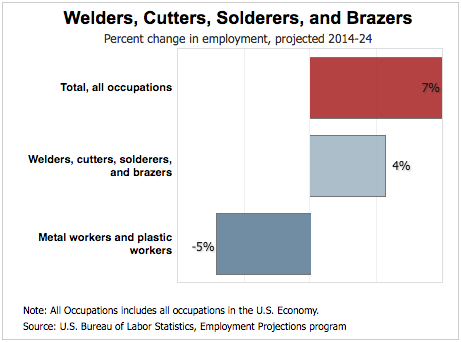TWS is a Great Training Option for Everyone
Learn more about how we can prepare you to advance your career.
The construction industry plays an important role in our country. Carpenters, electricians, welders, and other skilled workers construct and maintain roads, homes, and buildings. 1 In the coming year, the number of construction projects is expected to rise. 2 Skilled workers will be needed.

Industry Growth
Dodge Data & Analytics forecasts that the construction industry will see 5 percent more construction starts in 2017. The building of single-family homes will rise 9 percent and institutional building will jump 10 percent. Construction of commercial buildings and manufacturing plants will increase 6 percent.
The number of construction and extraction occupations is expected to increase by 10 percent through 2024, notes the Bureau of Labor Statistics (BLS). This is faster than the national average of 7 percent for all occupations. 3 The BLS predicts 14 percent job growth for electricians (47-2111). 4 Ironworkers, specifically reinforcing iron and rebar workers (47-2171), can anticipate 23 percent more jobs. 5 Twelve percent job growth is expected for plumbers, pipefitters, and steamfitters (47-2152). 6
Have You Considered a Career in the Skilled Trades?
Fill out the form to recieve a no obligation info packet.
Skilled Labor Shortage
For years, employers in the construction and manufacturing industries have reported difficulty finding qualified candidates to fill open jobs. This problem is known as the skilled labor shortage. It’s been a setback for small business owners.
In a survey conducted by the National Federation of Independent Business (NFIB), 45 percent of small business owners reported that they found few or no applicants who had the right qualifications for the jobs they were attempting to fill. The report noted that employers’ inability to find skilled construction workers was restricting the growth of housing building and causing prices for homes to rise. 7
Reasons for the Skills Gap
There are three main factors underlying the skilled labor shortage.
1. Recession
During the recent Great Recession, workers left the construction industry when they could no longer find jobs. Forty percent of the workforce left as nearly 2.3 million jobs were eliminated between April 2006 and January 2011. While the jobs returned when the economy recovered, the skilled workers did not. 8
2. Retirement
Many of the electricians, pipefitters, and other skilled construction workers are 55 years of age of older. In this physically demanding industry, workers usually retire when they are 65. When they do, skilled positions are left open with no one to fill them. Just a few years ago, the staffing firm Adecco reported that nearly 62 percent of U.S. companies were having trouble finding qualified applicants to replace retirees.

New: Industrial Maintenance
Learn About Our New Advanced Industrial Maintenance Program in Houston
Tulsa Welding School is proud to announce our newest program offering available at our Houston Campus – Advanced Industrial Maintenance Technology! Learn the skills you need to take on the industries of manufacturing, distribution, energy production and facility maintenance in as few as 7 months.
3. Training
High school students are often steered toward universities instead of trade schools. As a consequence, not enough young people are being trained to take the jobs of retiring skilled workers. In many cases, these men and women can’t find jobs in the fields they studied in college and are forced to take lower paying, unskilled positions. 9 Skilled trade training can be a missed opportunity for young people.
Meeting Construction Industry Demand
One major trend in the construction industry is a growth in jobs and a lack of workers qualified to fill them. Increasing the supply of workers could be one solution, and it starts with training. If more men and women received electrician training, pipefitter or welding instruction, and other important forms of vocational education, perhaps the construction industry would not continue to be plagued by a skilled labor shortage.
1 – https://www.bls.gov/ooh/production/welders-cutters-solderers-and-brazers.htm#tab-6
2 – https://www.construction.com/news/new-construction-starts-2017-increase-5-percent-713-billion-dollars-dodge-data-analytics-oct-2016
3 – https://www.bls.gov/ooh/construction-and-extraction/home.htm
4 – https://www.bls.gov/ooh/construction-and-extraction/electricians.htm
5 – https://www.bls.gov/ooh/construction-and-extraction/structural-iron-and-steel-workers.htm#tab-6
6 – https://www.bls.gov/ooh/construction-and-extraction/plumbers-pipefitters-and-steamfitters.htm#tab-1
7 – http://www.nfib.com/surveys/small-business-economic-trends/
8 – http://www.constructiondive.com/news/construction-industry-trends-2017/433151/
9 – http://www.marketwatch.com/story/there-really-arent-many-baristas-with-college-degrees-research-finds-2016-01-11
This blog has been labeled as archived as it may no longer contain the most up-to-date data. For a list of all current blog posts, please visit our blog homepage at https://www.tws.edu/blog/







